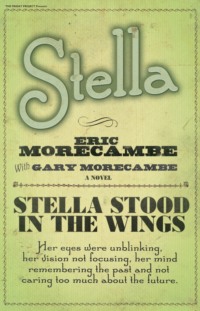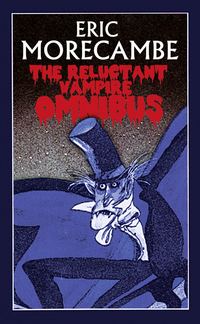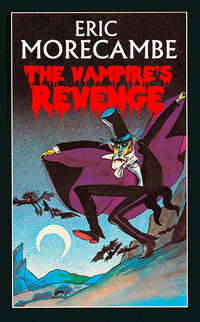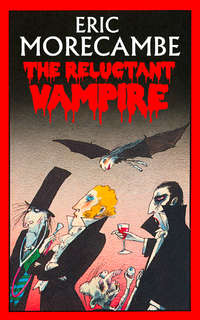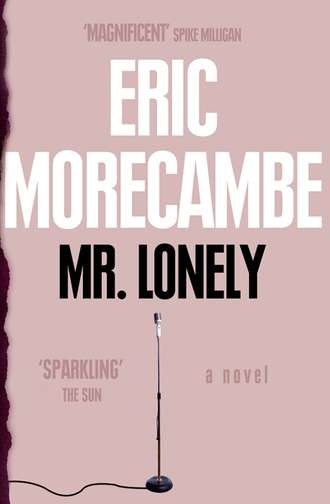
Полная версия
Mr Lonely

MR LONELY
ERIC MORECAMBE

MR LONELY
‘Sid Lewis came into this world exactly the same way as any other child. He weighed eight and a half pounds and had a shock of black hair … His childhood was normal—lumps, bumps and mumps. His schooling was average—sums, bums and chums. He left school when he was fourteen and went to work behind the counter of a tobacconist’s shop earning fifteen shillings a week and all he could inhale …’
So begins the Sid Lewis story, a tribute to that great and incomparable comedian who achieved stardom as Mr Lonely …
DEDICATION
This book is dedicated to my first grandchild, Amelia Faye Jarvis.
CONTENTS
Dedication
Foreword
Prologue
Chapter One
Chapter Two
Chapter Three
Chapter Four
Chapter Five
Chapter Six
Chapter Seven
Chapter Eight
Chapter Nine
Chapter Ten
Chapter Eleven
Chapter Twelve
Chapter Thirteen
Chapter Fourteen
Chapter Fifteen
Chapter Sixteen
Index
Copyright
About the Publisher
FOREWORD
Dear Reader,
This is not a biography of Sid Lewis written by someone who never really knew him. These are some wonderful stories and memories of a much loved man, who, when he appeared on our screens, most of the country would watch. I remember one Christmas show he did when thirty-five million people watched, and the repeat was seen three weeks later (by public demand) by no less than twenty-eight million. Put these two figures together and that show alone was seen by sixty-three million people. To me it proves how much we all loved him and always will. I well remember Sid once saying to me, ‘Eric, old palamino. What do they [the public] see in me?’ He gave me his Glenn Ford type grin and his eyes filled up as I told him, ‘Sid, I don’t know but be thankful they do.’ I was with him on many of the occasions mentioned in this book. Obviously there are a few, when, in all honesty, I could not and should not have been there, but these were retold to me by Sid himself or, in some cases, by the male or female involved. I have not put myself in Sid’s story. The story is about Sid, not me. My pleasure and happiness come from writing about him. I am offering you a few snatches from his life, nothing more; some funny, some sad. After reading this book I hope you will remain a fan of Sid’s and a friend of mine. All the photographs are from my own private collection and have never been shown publicly before. Here, I would like to say a special thank you to Miss Victoria Fournier for long nights we had to spend together in her flat trying to get it right. Also to my darling wife, Joan, for her understanding. As Bela Lugosi said in the film Dracula (1931), ‘Listen to them, children of the night. What music they make.’
Harpenden, England 1981
PROLOGUE
Sid Lewis came into this world exactly the same way as any other child. He weighed eight and a half pounds and had a shock of black hair. The trouble was, as he used to say, ‘It wasn’t on my head, it was all under my left arm.’ His childhood was normal—lumps, bumps and mumps. His schooling was average—sums, bums and chums. He left school when he was fourteen and went to work behind the counter of a tobacconist’s shop, earning fifteen shillings a week and all he could inhale. Twice a week he went to dancing class in the evenings. He was, apart from another fourteen-year-old boy called Ashley (that was his first name), who became quite well known as a ballet dancer, the only other boy, with twenty-two girls between thirteen and eighteen years of age. He learned more about girls in four weeks, or eight lessons, than was good for a young lad of fourteen. The thirteen- to sixteen-year-old girls wanted to practise with him, while the sixteen- to eighteen-year-olds wanted to practise on him. His mother did say to his father, ‘He must be working hard at that dancing class, he comes home exhausted.’ At eighteen he went into the army and worked his way through the ranks from private to captain of the ATS. Private Betty Grassford and Captain Maureen Collins. He always wanted to make major but she wouldn’t let him. He remained a corporal. He came out of the army at twenty-two, took a month off, then got a job for a while as a postman, and slowly, through singing, doing a few jokes and reading the wanted ads in The Stage, came into show business via pubs, clubs and church halls, working to OAPs, talent competitions and one summer as a Red Coat at Butlin’s Holiday Camp in Clacton.
He was now hooked. Performing was the only thing he wanted to do, and a comedian he wanted to be. For a few years, including the early part of his marriage, Sid found it difficult to make ends meet. It’s sad to say that his wife Carrie was no real help to him. She never thought him really funny and on the rare occasions she saw him work he always seemed to ‘die the death’. She loved him, though, and when things were tough she worked as a waitress or in some kind of job that would bring some money in. The first year of their marriage she earned more than he did, but she didn’t understand his wanting to be in show business. She never complained, yet she never understood. Carrie just wanted him to be the type of husband that brought in enough money to live on, to pay the rent, and to go to Yarmouth for a few days every year, the same as her father had done. Sid used to say, ‘We only had one child because she found out what caused it.’
I don’t think there was very much passion between Carrie and Sid. Just a gentle love that never gave out any real heat. What Sid wanted to do all through his married life was ‘To become a star’. He wanted to be a star for Carrie but she couldn’t understand that. What she wanted was for him to be average. He couldn’t understand that. They both became reconciled to each other and over the years their early, youthful love slowly developed into fondness. It was a great sadness because both of them deserved better from each other.
CHAPTER ONE
February, 1976
It was Tuesday morning. Sid came into the kitchen for his breakfast. He looked at the electric clock on the wall—nine-fifteen. Carrie, his wife, had already taken their daughter, Elspeth, to school and was now back in her kitchen making her baggy-eyed, unshaven husband his breakfast. Sid sat down with the ease of a still-tired man in that part of the kitchen that was known as the breakfast area. He picked up half a dozen lumps of sugar, picked out two special ones, put the others down and, like a Mississippi gambler, threw the two lumps of sugar towards the packet of Shredded Wheat. As they hit the box and stopped rolling he shouted in a loud voice: ‘Craps!’
Out of the corner of his eye he could see Carrie adroitly avoiding hot bacon fat and, at the same time, breaking two eggs to fry. In competition with the bacon and eggs was a male radio DJ of the older school, who was allowing an actor to tell all of this particular DJ’s audience how good the play he was appearing in was, and how good all the other actors and actresses in it were, and that the producer, although still quite young (a breathless twenty-two) was nevertheless, ‘my dear’, only quite brilliant, and the director, ‘my lambs’, a genius, and younger than Noel was. The music? Well—all of the best the West End has heard since Cole and, of course, Ivor. The show, ‘my loves’, was the best thing to hit town in Zeons and why people weren’t coming to see it in droves baffled him.
The older-type DJ was doing all his ‘of courses’ and ‘good Lords’ in all the right places, finishing up with, ‘Well, I just find that too hard to believe, Randy.’
‘Don’t we all, darling,’ purred the actor.
‘But after what you’ve just told me, I shall go and see Cosmo, The Faceless Goon myself.’
‘Moon,’ whispered Randy.
‘Moon,’ shouted the older-type DJ, who then announced the wrong theatre followed by the wrong performance time.
Sid thought, Older-type DJ, in this last ten years you have become an institution, and now that’s where you belong.
Carrie thought, Randy. I wonder if that’s short for Randal? She said, ‘How many eggs?’
‘One,’ said Sid.
‘One?’
‘Yes.’
‘But I’ve done you two.’
‘So I’ll have two.’
‘You’ve no need to have two, if you don’t want to have two. You can have one if you only want one.’
‘I’ll have two.’
‘Are you sure?’
‘Look, if I only have one, what will happen to the other one?’
‘I’ll have it.’
‘Do you want it?’
‘Well, I’m not bothered, but I’ll have it if you don’t want it.’
‘Give them both to me before I go off the idea of either bacon or eggs. Have you grilled any tomatoes?’
‘No.’
‘Well, that’s a relief. That means to say that if you had and I didn’t want them, you won’t have to have them now.’
‘Are you ready for them?’
‘Yes, if they’re ready for me and incidentally …’
‘Yes?’
‘I don’t want the tomatoes.’
Carrie gave him his bacon and eggs. ‘What time did you come in last night?’ she asked.
‘About three. If you’re going to do any tomatoes, I’ll have them.’
‘I didn’t hear you. I didn’t hear the car.’
‘I turned the engine off before coming down the drive. These eggs are great. I’ll take bets they were brown eggs.’
‘One of each.’
‘Oh, I would say the one on the left was the brown one.’
‘I didn’t feel you get in the bed.’
‘You should have done. I made love to you twice.’
‘I don’t think that’s at all funny. You’re getting crude in your old age. Pass me the plate when you’ve finished.’
‘It was like a joke,’ he said, passing the now-empty plate.
‘Coffee?’
‘Yes please, but without tomatoes.’
‘You probably see all the tomatoes you want at the club,’ Carrie said, putting the plates in the sink. ‘Do you mind instant coffee this morning as I’m in a bit of a hurry?’
‘Instant coffee’s fine,’ Sid said, undoing his dressing-gown cord. ‘But what’s that about the tomatoes at the club business?’
‘Do you want cold milk or half and half?’
‘I’m easy.’
‘We’ll have the cold milk, then.’ Carrie got the cups ready and started to pour the coffees. ‘Three o’clock’s late. You’re usually home by two.’
‘Lard asked me back to his room for a drink after he’d finished.’
‘Who?’
‘Lard. Lard Jackson. He’s the star this week.’
‘That black man, who was on Nationwide the other night?’
‘Most likely.’ Sid picked up his two special sugars and dropped them into his coffee. ‘He’s a nice fella.’
‘What does he do?’
‘He’s got a number in the Top Ten. He finished his act with it.’
‘What’s it called?’
‘Let me do it to you again, baby.’
‘Good Lord.’
‘It’s a song.’
‘Hmmm.’
‘No, it is.’
‘Is he married?’
‘I don’t know. I never asked him. How can I say, “Hello, Mr Jackson, are you married? I’m asking for my wife”?’
‘Is his first name really Lard?’
‘As far as I know—yes.’
‘How does anybody call themself Lard?’
‘Well, he says, “What’s cooking?” a lot.’ Sid looked at her over the rim of his coffee cup. After fifteen years of marriage he knew when she was on edge. She wasn’t happy about him coming home late.
‘I suppose his dressing-room was full of women.’
‘Packed,’ Sid smiled to himself. ‘We counted them. Seven black and seven white. All the black women were dressed in white and all the white women were dressed in black, otherwise we couldn’t have told them apart.’
‘Very funny.’
‘I thought so.’
‘Do you want another cup?’
‘Nope.’
‘Elspeth saw something this morning,’ said Carrie.
‘Pardon.’
‘Elspeth. She saw something.’
‘Oh.’
‘Yes.’
‘Good.’
‘What do you mean—good?’
‘Well, I’m glad for her sake.’ Sid was at a loss. ‘I will have some more coffee if there’s any left.’
‘She’s twelve.’
‘I know.’
‘Well—she saw something.’ Carrie whispered, ‘You know, she saw something.’
Sid looked blankly at his wife.
‘Her periods have started,’ Carrie said.
‘Good God. She’s only twelve.’ Sid was embarrassed. ‘I mean—she’s twelve years old.’
Carrie smiled to herself for the first time that morning. Now she felt in charge. ‘I was thirteen.’
‘Yes—but you are older than her.’ Sid wanted to get off the subject as soon as possible. ‘Er. Is she all right?’
‘Fine.’
‘Good.’ That was final as far as Sid was concerned. ‘What was that you meant about the tomatoes? You said, “You see all the tomatoes you want at the club.” Do you mean tomatoes as in women or as in thrown?’
‘Nothing.’
‘If it’s women, I’m flattered. If it’s thrown, I’m hurt. But if it’s women, which women? The waitresses, or the bar ladies, or the disco dancers? And what about all those young women who work in Boots or Marks and Spencers? If I’d had as many women as you seem to think I’ve had, I should have died a long time ago from a rare disease called ecstasy.’ Sid stood up from the small breakfast table and put the chair back under it, picked up his cup and walked towards the sink. ‘And if the term is thrown, I’d like you to know I’m good enough not to get anything thrown at me, and if you would come to the club and see me work sometimes you would find that out. I’ve been working there for the last two years and you haven’t been once. Half the staff think I’m a widower.’ He was rinsing his cup under the tap.
‘I don’t like nightclubs.’ She picked up the drying cloth and took the cup from him.
‘Sweetheart, there are times when I hate the sodding place.’
‘Don’t swear!’
‘But I work theatres, clubs, TV and kiddie shows. I sometimes work seven days a week.’ Carrie gave him back the cup. ‘And I do it for two reasons. One is that I enjoy working and the other is that I do it to earn money so I can give you and Elspeth a nice home. There’s not many other comics who work as regularly as I do.’ Sid washed the cup again. ‘But I still get the impression that you want me to have a nine-to-five job.’
Carrie said, ‘That’s twice you’ve washed that cup.’ Sid put it down. ‘I’m going to Sainsbury’s.’ Carrie didn’t want to get caught up in a quarrel because she never did win a verbal argument with Sid anyway. He was much too devious. It was all the practice at the club. She put her coat on. Sid wiped the cup dry. There was a little bit of silence now, except for Glenn Miller belting out ‘Little Brown Jug’ for a senior citizen of ninety-seven. ‘Mrs Gerry will be here about ten. She’s having her hair done. I said it would be all right. Don’t stop her from working by telling her how hard you work. Could you pass me the plastic carrier off the doorknob?’ Sid did. ‘I’ll be back about one o’clock to get you a bit of lunch.’
Carrie left by the back door to get to the garage. Sid watched her go. She’s still an attractive woman, he thought. He had to smile to himself. She was going to Sainsbury’s with a plastic bag that told the whole world how good Macfisheries were. Maybe she had a sense of humour after all.
The elder DJ obviously had a sense of humour. He was now talking to some idiot who had written a new book on diet and health called Fry Your Way to Fitness. The DJ got in a good ad lib. He said, ‘I’m a stone overweight. Fry me.’
CHAPTER TWO
March, 1976
Sid opened the left door on the third floor and walked out of the Tardis towards the door with ‘MGM Agency’ on it. He took the advice of the sign that said, ‘Enter’. A young, attractive woman was busy typing directly opposite the door. To his right on the carpeted floor was a comfortable bench seat fully occupied by the three it would take. Nearest to Sid sat a sixty-eight-year-old, once-famous film star screen lover, Gavin Wright, now hoping for any small part, but it must be a part—‘I will not do extra work’. He was seated next to Lennie Price, the very latest black comedian from the new wave of black comedians. His style was to knock his own kind, his own people, make out he was white. Next to Lennie was an actor with a small ‘a’ whom millions of people had seen on television at least once a fortnight for the previous five years and yet not one of them would recognize him if he offered to pay their income tax. He had the kind of face that made people say, ‘Just a moment. Aren’t you … er? You know … the, er. My wife thinks you’re … You do the … er. You’re on every … night. Yes. You’re what’s-his-name.’
Sid had an appointment with Leslie Garland, the ‘G’ part of MGM: Mitchell, Garland and Maybank. He had been with Leslie now for about six years. Leslie did the light entertainment side, clubs, one-nighters, theatres, summer season and pantomime. Stan Mitchell was the straight side—West End plays, straight plays on TV—while Richard Maybanks was the overseas rep; Singapore, Hong Kong, the States and Australia. Sid had never seen Maybanks.
The girl looked up from her typing and smiled. ‘Good morning, Mr Lewis. I’ll tell Mr Garland you’re here.’ The others in the waiting-room looked at Sid as he gave a nod. She phoned through to Leslie’s office and told him: ‘Mr Lewis is here.’ Sid waited for the reply. ‘Mr Garland says five minutes, Mr Lewis.’ Another phone rang. She put it to her ear. ‘Yes?’ She put the receiver back. ‘Mr Mitchell will see you now, Mr Wright.’
The sixty-eight-year-old, once-famous lover of the silver screen creaked through the waiting-room towards the big red leather door and disappeared behind it. Sid sat next to Lennie Price on the still-warm seat left vacant by the old screen lover. Lennie looked at Sid and, with a smile, said, ‘I’m Lennie Price.’
‘Sid Lewis.’
They shook hands.
‘I saw you at the Starlight Rooms, when the Three Degrees were there. Great,’ Lennie said.
Sid didn’t know whether he was saying that Sid was great or the Three Degrees. He took no chances. ‘Yes, they were.’
‘Fantastic.’
‘Great.’
The actor with a small ‘a’ was reading the television part of The Stage and never once looked up.
‘Does Leslie do your work, then?’ asked Lennie.
‘Yes. I’ve been with this office over six years now.’
‘I’m hoping to see him. I’d like him to do my work. Do you think he’s any good?’
‘Kept me in pretty regular work.’
The red leather door opened and out came the ex-silver screen lover. You could tell by the look on his face that work was not coming his way that day. He left the waiting-room without a word.
‘Who’s at the Starlight Rooms this week?’ asked Lennie.
‘Cliff.’
‘Cliff?’
‘Richard.’
‘Great.’
The actor asked, ‘What time is Mr Maybanks due?’
‘I’ll ask his secretary,’ said the pretty typist. She dialled a number and asked, ‘What time is Mr Maybanks due? I see. Thank you.’ She put the receiver down and looked at the actor. ‘Not till Thursday. He’s been delayed in Canada.’
‘Oh. I thought he was due back yesterday.’
‘He was, but it’s snowing in Canada.’
‘Yes. Well, I’ll call again on Thursday.’
‘Fine. Who shall I say will be calling?’
‘Colin Webster.’
Of course, thought Sid, Colin Webster.
‘Goodbye, Mr Webb,’ said the pretty secretary.
Exit stage left, thought Sid.
Behind the big red leather door Sid and Lennie heard male and female laughter. Leslie held the door open for a woman called Marcia Vaughan, the best stripper in the country. Well, if not the best, certainly the fastest. The star of all the sexy revues.
‘Hello, Sid,’ she said. ‘How’s Carrie and Elspeth?’
‘Fine, thanks. Reggie okay?’
‘As good as he’ll ever be. That’s not saying much. I think he thinks it’s fallen off. He’s put on so much weight. I see it more than he does. Goodbye, darling.’ A kiss was exchanged that wouldn’t have shocked a vicar’s maiden aunt. ‘Bye everyone,’ she said and left.
‘Bye, darlink.’ Leslie smiled at everyone in the little room and they all dutifully smiled back. He seemed to be enjoying a certain power. Slowly he lit a small seven-inch Havana cigar. ‘Sid,’ his voice cracked. Sid jumped up to follow him through the red door. He noticed it wasn’t held open for him as it had been for Marcia.
‘How’s Coral?’ Leslie asked.
‘Carrie’s fine, thank you.’
‘Good.’ They were now halfway up the small corridor. ‘And the kids?’
‘She’s fine.’
‘Good.’
They entered his office. It was very large. A beautiful desk was placed so that Leslie sat with his back to the window and a couple of easy chairs were on the other side facing him. On a bright day you had the sun in your eyes so that you could not see him clearly. You were always in an inferior position. You were being looked down upon. A psychological advantage. A beautiful, small carriage clock was facing you. It had a loud tick. Leslie always kept turning it towards you and he always gave you the impression that you were wasting his time.
‘Sit down, Sid,’ he said.
‘Thanks. I … er … won’t keep you. I know how busy you …’
‘Good.’ Leslie turned the clock full-face towards Sid and rested his hand on it.
‘It’s … er … just to … you know, er … to … er. How’s Rhoda?’
‘Who?’
‘Rhoda. Your wife.’
‘Haven’t you heard?’
‘What?’ Sid asked, with fear in his voice.
Leslie Garland’s eyes raked Sid’s now almost quivering face. ‘No matter.’ He looked at the clock again.
Sid wondered whether to ask about Rhoda or to carry on about himself. What he said was, ‘Oh, I’m really sorry about that.’
‘About what?’ Leslie asked.
‘Rhoda,’ answered Sid, giving a sickly grin.
‘What about Rhoda?’
‘What you said,’ Sid said, with a nervously drying mouth. ‘Carrie will be upset.’
‘Who’s Carrie?’
‘My wife,’ Sid replied through an almost closed mouth.
‘What is it you want to see me about, Sid?’ Leslie asked with a small sign of temper.
‘Well,’ Sid began, ‘I’ve been working at the club now for two years or so and I thought …’ The phone rang.
Leslie raised his hand from the clock and picked up the phone. ‘Yes?’ he shouted.
Sid stopped talking and tried to give a non-listening look.
‘Shirley who?’ Leslie bellowed. ‘Okay. Put her on. Hello, Shirl. Yeh. Fine. How’s Warren? Good. Give him my very best. And he should live to be 120. Rhoda? Haven’t you heard? We’ve split. Yeh. She took off with the chauffeur. Yeh. Last week.’ He nodded to the phone. ‘Don’t worry. Everything you’ve asked for has been done. I promise.’
Sid was looking at some pictures around the walls.
‘Yeh, the orchestra. Everything. The advance? Great. It’s great.’ Leslie smiled for the first time. ‘You’ll be a sell-out. I’m telling you. Yeh. The dressing-room’s been altered to your specifications. A bathroom with a shower. Yes. A TV, and a bar—all in blue and gold. Yeh. Yeh. Yeh. Ah-ha. Yeh. Sure. Of course. Yep. Okay. Sure. Natch. Anything, why not? Of course you’re not being difficult. If you don’t deserve it, who does? A what?’ Leslie’s eyes almost glazed over. ‘Yeh, surely, but that could be a little difficult. Yes. A coloured maid. I’ll try. You don’t mind if she’s a Jamaican, do you? A Jamaican. You know, West Indian. Sure they speak English. An ice maker? Yes. Air-conditioning? Yeh. Okay. A what? A Teas made. Yes, they are cute. And a limo. A Rolls. Fine. Of course, with a driver. A black one. Is that the Rolls or the driver? A white Rolls with a black driver. What?!! Sixteen seats on the front row on opening night? For your relatives? That’s a lot of money. Oh, sure. Of course, I’ll see that the theatre pays for it,’ he said, turning heart-attack grey.


